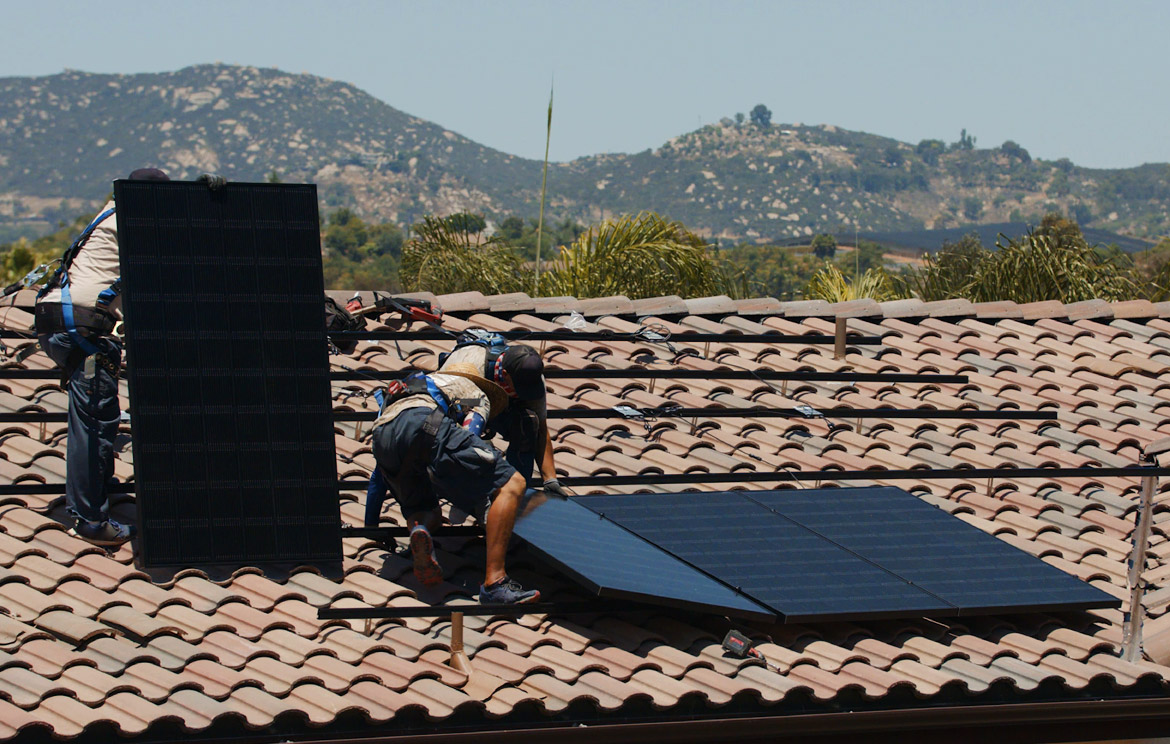




With the recent Pineapple Express storm pounding California with more rain and more extreme weather than usual, homeowners might be left wondering about the effect of weather on solar panels. Here’s what you need to know about how solar panels work and how weather may affect them.
The way solar panels work is because of a cell panel that converts sunlight directly into electricity. When photons (particles of sunlight) hit them on top of a roof, the panel turns the photons it receives into electrons of direct current electricity. The inverter then converts the direct current electricity into alternating current power, which can be used to power household items.
A common misconception about solar panels is that they need direct sunlight in order to work. Although the sun is the main source of energy that they absorb and convert into power, the way that it is projected onto a solar panel cell doesn’t necessarily require direct sunlight.
Solar panel cells actually just need the photons emitted from daylight sun. In other words, even if it’s cloudy out, the sun’s photons are still being spread into the atmosphere and absorbed into the panels. That being said, direct sunlight is still preferred over indirect sunlight for optimal energy absorption. On cloudy days, solar panels produce only 10 – 25% of their capacity. Factors that make this range an approximation include the density of the clouds, as well as the type of solar panel; some can handle diffused light better than others.
Most solar panels are built to handle a wide range of climates and conditions, including heavy rain, hail, wind, heat and cold. This is good news for areas that are impacted by storms, rain and snow. During the manufacturing process, each solar panel is tested for extreme weather conditions to receive an Underwriter’s Laboratories (UL) certification. While this certification is a good baseline, it doesn’t mean that all solar panels uphold the same durability and quality. It simply means they have passed the minimum number of tests required to be certified.
More specifically, high winds, snow, and cold temperatures shouldn’t be a concern. Top-rated solar panels are engineered to withstand winds of up to 140 MPH. As for harsh winters — cold temperature can actually improve solar panel output, and white snow can reflect light and improve photovoltaic performance. So long as panels aren’t covered in snow, winter climates can actually be an ideal environment for solar panels. Snow will usually melt and slide off panels easily; if it does build up, simply use a broom to brush it off.
Of course, solar panels aren’t entirely invincible. Lightning and hail can damage solar panels in extreme cases. Consumers should look into their homeowner’s insurance policy, which usually covers solar panel damage if it is not included in the solar panel’s warranty. Additionally, be aware that hot climates may actually reduce the efficiency of solar panels. For any temperature above 87 degrees Fahrenheit, a one-degree increase in temperature can equate to a 1% decrease in efficiency.
Most inclement weather won’t have a huge impact so long as they are high quality and boast durability as one of their main attributes. Many top-rated solar panels have a proven track record of durability, degrading at a slower rate than others. In fact, the manufacturer guarantees that the system will produce 92% of its rated power after 25 years of use. Durable solar panels also protect the roof of your home from harsh weather conditions, acting like a barrier. Panels are built to hold a certain weight, so the more durable your panels, the better they can withstand snow or hail.
One key factor to ensuring weather doesn’t become a hindrance is making sure the panels are properly installed. Your money is on the line, so make sure the solar installation company that you go with is reputable among the solar industry. The installer should understand the types of local wind patterns and climate conditions your area typically receives, and help you pick the right solar panels to match these needs.
Even if you live in California where the sunnier-than-average climate is ideal for solar , it’s normal to wonder how the weather might affect their efficiency. The science behind how panels absorb photons speaks to why they still work on cloudy days, and the durability of the panels allows them to withstand just about any weather scenario. At the same time, it’s important to choose the best quality solar panels and look for an installation company that can properly install panels so that they are secure and ready to face any weather condition.
To find out more about what makes a top-rated solar panel worthy of installation, start by asking these 10 Questions About Solar Panels — that way you can ensure your panels will remain sturdy on your roof, whatever the weather may be.